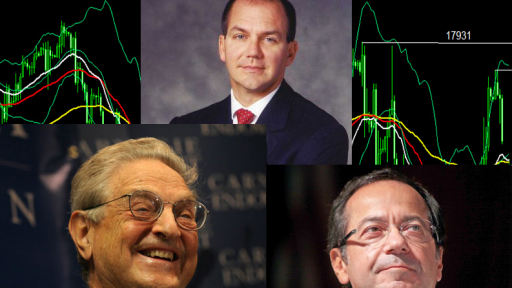- Home
- >
- Great Traders
- >
- Three Of The Best Traders Alive

Three Of The Best Traders Alive

While all investors must trade, a "trader" by profession does not technically make investments. According to Benjamin Graham, a founding father of the value investing movement, an investment must promise "safety of principal and an adequate return." Investors make informed decisions after careful analysis of the business fundamentals of a company. Traders, on the other hand, use technical analysis to place bets engineered to profit on short-term market volatility.
In the early 2000s, it was not uncommon for people to quit their jobs, empty their 401(k) plans and actively trade for a living from the comfort of their homes. Fueled by massive stock market and real estate bubbles, it was hard to lose money. However, this golden age has come and gone. The year 2007 brought with it a global recession and subsequent proliferation of financial regulation. High-frequency trading, carried out by computers running incredibly complex algorithms, now account for between 50 and 70% of trade volume on any given day of trading.
Traders frequently lose large chunks of money over the course of a single day of trading, hoping that their gains will offset their losses over time. They must also overcome significantly higher transaction costs and competition with super-computers. While the cards are stacked against traders in general, there are a handful of traders with enough brains, boldness and capital to take on the odds.
Paul Tudor Jones (1954-Present)
The founder of Tudor Investment Corporation, a $12 billion hedge fund, Paul Tudor Jones made his fortune shorting the 1987 stock market crash. Jones was able to predict the multiplying effect that portfolio insurance would have on a bear market. Portfolio insurance, a popular risk management tool, involves buying index puts to lower one's portfolio risk. Thus, in a bear market, more and more investors will choose to employ their put options and drive the market down even further. Jones' bet paid off big: on Black Monday of 1987, he was able to triple his capital from his short positions. Jones is worth roughly $3.6 billion today and is currently managing his hedge fund.
George Soros (1930-Present)
George Soros is arguably the most well-known trader in the history of the business, known as "The Man Who Broke the Bank of England." In 1992, Soros made roughly $1 billion in a bet that the British pound would depreciate in value. At the time, the pound had been introduced into the European ERM rate - an exchange rate mechanism designed to keep its listed currencies within a set of defined parameters to increase systemic financial stability. With the help of his associates at his hedge fund, the Quantum Investment Fund, Soros noticed that the pound was not fundamentally strong enough to stay in the ERM, and built up a short position to the tune of $10 billion. Soros is currently worth an approximated $19 billion and is retired.
John Paulson (1955-Present)
Praised by some for executing the "greatest trade ever," John Paulson made his fortune in 2007 by shorting the real estate market by way of the collateralized-debt obligation market. Paulson founded Paulson & Co. in 1994 and was relatively unknown on Wall Street - that is, up to the financial crisis that began in 2007. Foreseeing the asset bubble in real estate, Paulson's funds made a reported $15 billion in 2007, while Paulson himself pocketed a tidy $3.7 billion. For profiting stupendously while the global economy staggered, Paulson came under intense scrutiny of the U.S. federal government during this time. Today, Paulson continues to manage Paulson & Co. and is worth roughly $11 billion.
The Bottom Line
Jones, Soros and Paulson all have one thing in common: their most lucrative trades were highly leveraged shorts. The conflict of interest is clear. Traders have every incentive to profit off of an imbalanced financial market, often at the expense of every other market player. Furthermore, their actions tend to prolong and exacerbate the initial financial imbalance, sometimes to the point of complete and total market failure. Should they have this capability? Well, that's for legislatures to decide.
 Varchev Traders
Varchev Traders If you think, we can improve that section,
please comment. Your oppinion is imortant for us.






